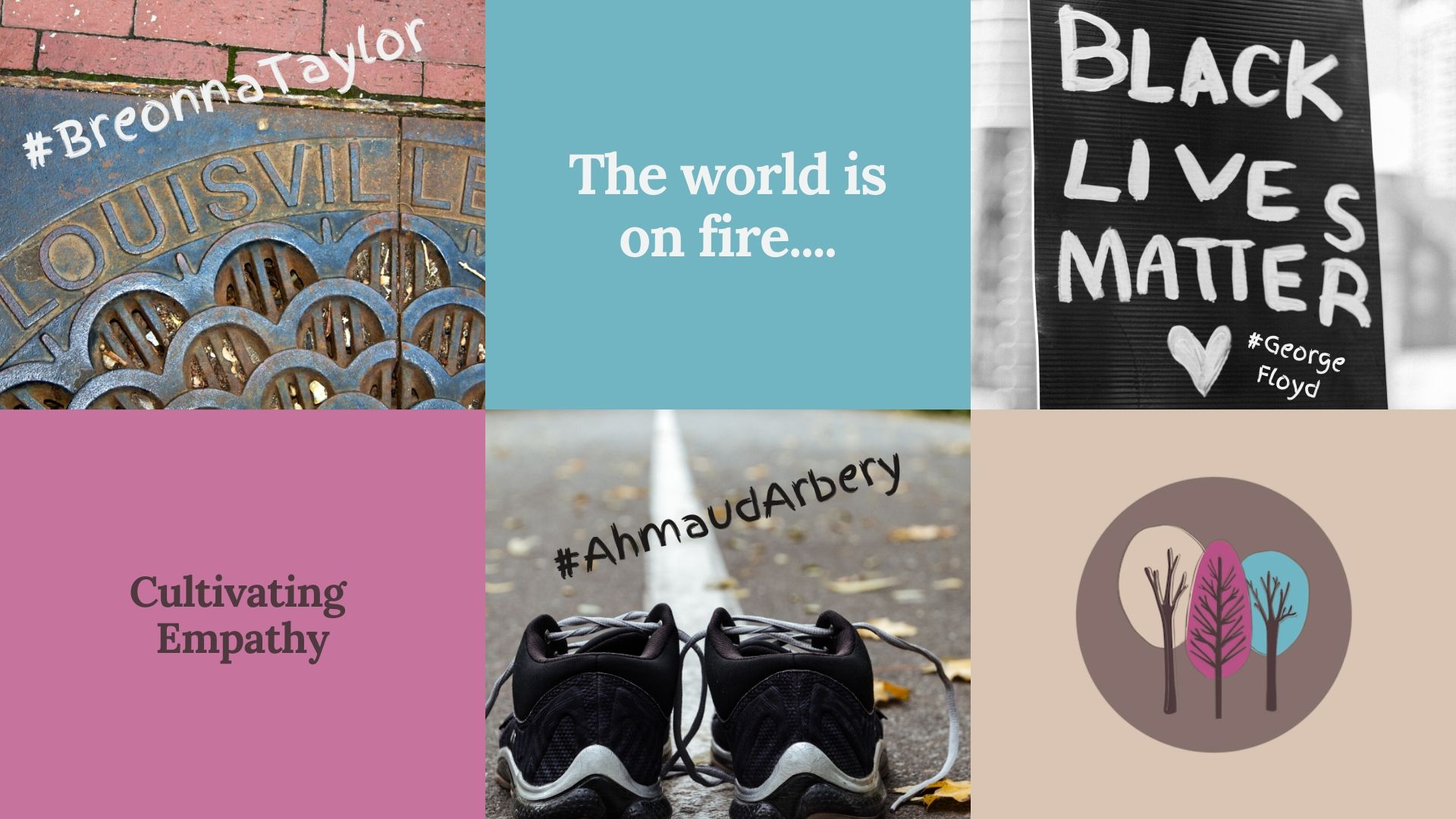For men of color, White women, and White men to stand in solidarity with women of color (and for us to stand in solidarity with one another) requires them to adopt an ethic of caring, a position of receptivity, trust, and empathy toward the truths that women of color tell as well as the emotional expressions with which we tell it.
~ Dr. Chanequa Walker-Barnes
I Bring the Voices of My People:
A Womanist Vision for Racial Reconciliation
Cultivating Empathy
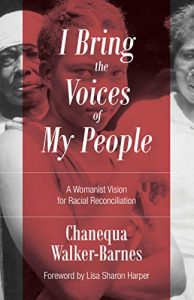 If we meet fear with more fear, anger with more anger, grief with more grief, then we miss the heart of our current national uprising.
If we meet fear with more fear, anger with more anger, grief with more grief, then we miss the heart of our current national uprising.
How can we cultivate empathy for individual and collective black experience? To do this work, we need to see and hear the stories. And we need to find ways to identify and imagine what the fear, anger and grief are like by putting our white feet on the ground alongside our black neighbors. More to the point, white people need to follow the advice of Dr. Chanequa Walker-Barnes and “adopt an ethic of caring, a position of receptivity, trust, and empathy toward the truths that women of color tell as well as the emotional expressions with which we tell it.”
This post highlights the voices of black women who can help us cultivate empathy for three stories of trauma and loss. The stories are full of violence and pain, so please take this as your warning that the material is difficult and may bring up strong feelings.
The aim for this conversation is to help people who have reached out to me and who are struggling to find a way into racial justice work, yet they feel anxious or unsure about how to interpret what is happening. My purpose is not to center my interpretation, although by curating these stories, my interpretation is part of the mix. Instead my purpose is to give you a space in which to listen with courage to the voices of women who can help us all understand the pain and grief that drives this moment of uprising. With more understanding comes more empathy. And with more empathy comes more clarity about how to become part of the work for justice.
An invitation to be a witness
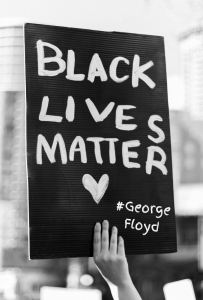 As you take in these stories, let your imagination and compassion see them fully, and put yourself as a witness deep into the story. Do not rush to judgement or pre-occupy yourself with what YOU would do. Let the stories speak. Listen and take them in on their own terms.
As you take in these stories, let your imagination and compassion see them fully, and put yourself as a witness deep into the story. Do not rush to judgement or pre-occupy yourself with what YOU would do. Let the stories speak. Listen and take them in on their own terms.
First, hear the plea of a black mother, Christy Oglesby, a mother who works to protect her son from the kind of violence that killed George Floyd.
In her opinion piece at CNN.com, Christy Oglesby writes about hearing George Floyd cry out for his Mama in his last breaths. Her parental instincts were activated instantly. She says, “He wasn’t my baby, but he was someone’s child. And he needed someone with a mother’s love to help him.”
Oglesby says what she needs me as a white mother to hear and to say clearly to all my friends who are white and especially parents: “I need them to hear that cry and to tell their sons and daughters that my child is a human. I need them to declare and believe that he’s in danger, that I can’t protect him by myself and that his life matters to me and to them. I need them to tell their white friends’ children, too. My child’s life is sacred. My child is not dangerous.”
As a mama Christy Oglesby has been spending her every waking moment thinking about how to protect her son from world that defines him as an enemy. As a result, she feels exhausted, and she is asking for help from you and me.
She says, “I’m tired. I’m tired of being scared for him. I’m tired of reading about Ahmaud [Arbery], Travis [Miller], George and so many others. The list never stops. I need the white mamas to share this burden. I need my white friends to love me and mine enough to come running, too.”
White mamas, what do you say? She is calling to you. What will you do with that call?
+++++++
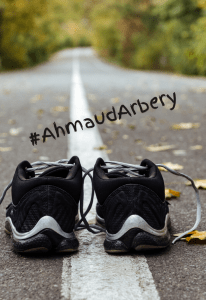 Now, let’s hear from another black mama who grieves the death of her son, Ahmaud Arbery. She also longs for justice.
Now, let’s hear from another black mama who grieves the death of her son, Ahmaud Arbery. She also longs for justice.
Wanda Cooper-Jones, says she recalls talking to her son eight years ago, when he was still in high school, about the 2012 Trayvon Martin case. They “agreed Martin was wrongly profiled and killed.”
In February of this year her 25-year-old son was stalked and chased by two white men, killed while he was jogging. His only way to defend himself was with his own two hands. After they murdered him by shooting him, they defiled him further with the N-word as he lay dying.
Arbery’s Mama says, “I am hoping that the death of my son, and also Mr. Floyd will implement change. We need change. So that no other African American male will lose his life in such a manner.” You can hear her voice in this brief interview.
Ahmaud Arbery's mother says the claim Travis McMichael used the N-word after shooting her son leaves her speechless.
"He… ran for his life. When he couldn't run anymore, he had to fight. And then after he fought, he was killed. It's very hard to know that he endured that." pic.twitter.com/n6d6TX56Nc
— Cuomo Prime Time (@CuomoPrimeTime) June 5, 2020
Will they die in vain? Or will we, will you, really recognize how these deaths are part of a larger and enormously widespread and systematic violence against black men… and women… and people of all genders? Can we stir up empathy for the magnitude of these losses?
+++++++
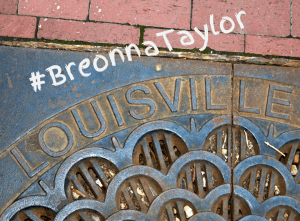 Young black men are not the only ones dying unjustly by the hands of white police. In March in Louisville, Kentucky, Breonna Taylor, an Emergency Medical Technician was shot at least eight times. Just stop right there. Pause over eight times. Awakened from sleeping in her own bed. She died in her hallway without comfort from family. Additionally, her family was not notified of her death for approximately 12 hours. Her mother, Tamika Palmer, was sent on a wild goose chase to the hospital and back, trying to see Breonna and learn where and how she was. Can you imagine?
Young black men are not the only ones dying unjustly by the hands of white police. In March in Louisville, Kentucky, Breonna Taylor, an Emergency Medical Technician was shot at least eight times. Just stop right there. Pause over eight times. Awakened from sleeping in her own bed. She died in her hallway without comfort from family. Additionally, her family was not notified of her death for approximately 12 hours. Her mother, Tamika Palmer, was sent on a wild goose chase to the hospital and back, trying to see Breonna and learn where and how she was. Can you imagine?
There are so many reasons this case is disturbing. So many reasons the police should never have been there. But what I want you to focus on right now and first, is this young woman, age 26. She was full of promise and life and education, an essential worker with plans to serve people in health care. She is dead.
Let’s think about this situation through these questions: Do you fear going to sleep at night? Have you been assaulted in your sleep? Has anyone broken into your home with the intent of violence and harm? If so, I certainly want to support you in getting help and support you need. Please use these numbers to begin reaching out for help immediately.
Breonna Taylor was not doing anything but sleeping in her own bed. And even if she had committed a terrible crime, she did not deserve to die. She did not deserve police breaking into her home and shooting her. If you are feeling anxious to get to talking about the situation of the case, or to say why it was an accident, or why it was an easy mistake, or something about the problems of drug use, or a defense of police officers…. then I want to invite you to pause again. Hold off on going to any of those places.
+++++++
To gain empathy for someone whose experience is not like our own, we need to see, hear, and attend to the experience of another human being. Before social analysis. Even before we draw conclusions. Before inserting our narrative(s) into their stories. First we need to become witnesses to the stories and experiences people we wish to understand.
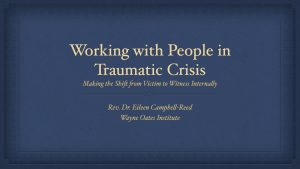 Many people, including me, need to continue our own internal work of becoming witnesses to our own suffering and loss. One approach to that work is to shift our internal experiences from victim to witness, through practices of prayer and meditation. As we strengthen our capacity to be a witness to the trauma, grief, pain and loss within ourselves, we also expand our capacity of empathy for other people.
Many people, including me, need to continue our own internal work of becoming witnesses to our own suffering and loss. One approach to that work is to shift our internal experiences from victim to witness, through practices of prayer and meditation. As we strengthen our capacity to be a witness to the trauma, grief, pain and loss within ourselves, we also expand our capacity of empathy for other people.
+++++++
If you have come this far, then you are approaching the work with courage. You can do this. I encourage you to keep finding spaces in which to listen bravely to the voices of black women and women of color who can help us all understand more. Sometimes other loud voices drown out the women, but there are many public voices of black women. Make the effort to center them.
The world is on fire. And at this moment we need the particular voices of black women and women of color. We need to listen with “receptivity, trust, and empathy” as Dr. Walker-Barnes recommends. With trust and empathy comes more understanding. And with more understanding comes more clarity about how to become part of the work for justice.
If you want to share feedback on this post or the work we are suggesting, I invite you to reach out, and contact me here. And please join us in the coming days for the next three posts. We are just getting started.
- How can I value people over property?
- How will I prioritize the voices and perspectives of black lives?
- Where and how can I join the movement(s) for justice?

